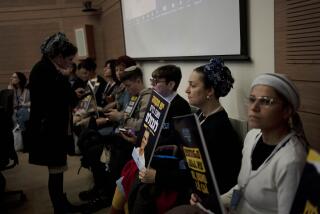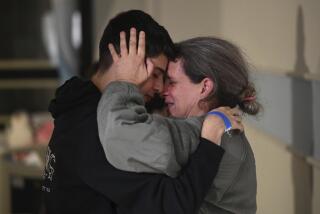Hostage Kin of Emir Pleads for Convict Release
ALGIERS, Algeria — A member of Kuwait’s Royal Family spoke today from the hijacked Kuwaiti jetliner and pleaded with his government to yield to the gunmen’s demands to end the two-week ordeal.
Most of the brief radio message from Fadel Khaled al Sabah was impossible to understand, except for the part about their demand that Kuwait free 17 pro-Iranian prisoners convicted in the 1983 attacks on the U.S. and French embassies in the Persian Gulf sheikdom.
“I hope that Kuwait releases all the prisoners,” the man said, speaking in Arabic in a feeble, halting voice. Kuwaiti officials insist they will not give in to the hijackers, who have killed two Kuwaiti passengers.
Emir’s Distant Relatives
Three of the approximately 35 people still aboard the Kuwait Airways Boeing 747 that was hijacked April 5 are distant relatives of the emir of Kuwait. Two of those relatives are women.
Hostages released earlier have said Fadel is in worse condition than any of the other hostages aboard the jet, describing him as “the most psychologically broken down” and suffering from a stomach ailment.
When the message was read on the plane’s radio about 3:10 p.m. local time, the control tower had trouble understanding it.
“It was not very clear. Could he try to say it once more?” the control tower said in English.
“No, because he doesn’t want to speak, but I want to confirm that he is one of the Royal Family, he is Fadel al Sabah,” a hijacker responded in English.
No New Deadline
Radio conversations today made no reference to refueling the plane or leaving Algeria. On Saturday, the gunmen said they wanted fuel to fly elsewhere and commit a “massacre,” but Sunday they said they would give Algeria more time to seek a solution. No deadline was announced.
The hijackers and their hostages appeared to be fasting today, the first day of the Muslim holy month of Ramadan. By late afternoon, they had not requested that any food be brought to the plane, although some of those aboard could still be eating stored provisions.
During Ramadan, observant Muslims do not eat or drink during daylight hours.
Talks lasted late into the night, and two hooded hijackers even descended from the plane to meet with an Algerian negotiator this morning in a car on the airport tarmac, but the pace of contacts seemed to slow during the hazy, hot day.
More to Read
Sign up for Essential California
The most important California stories and recommendations in your inbox every morning.
You may occasionally receive promotional content from the Los Angeles Times.










